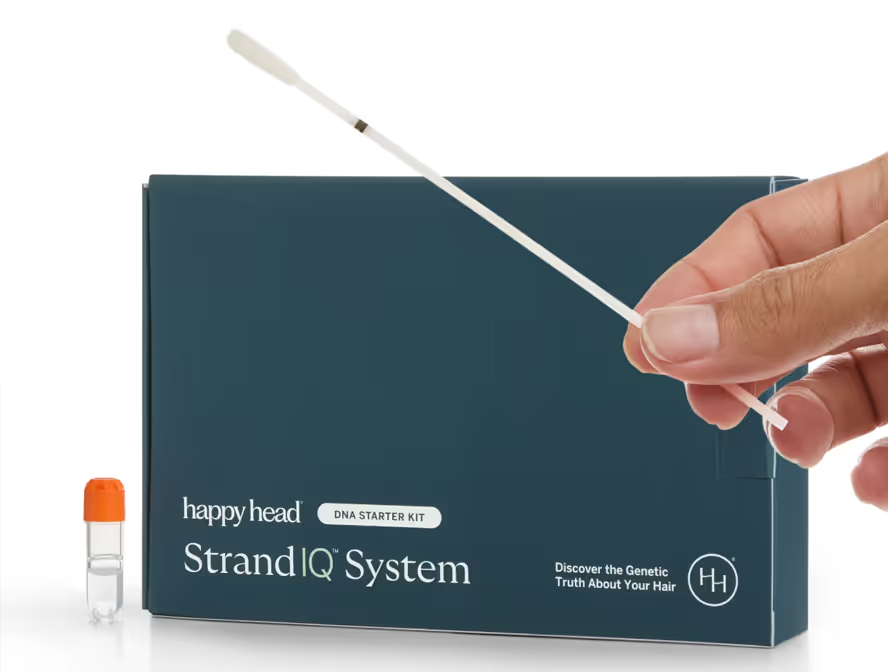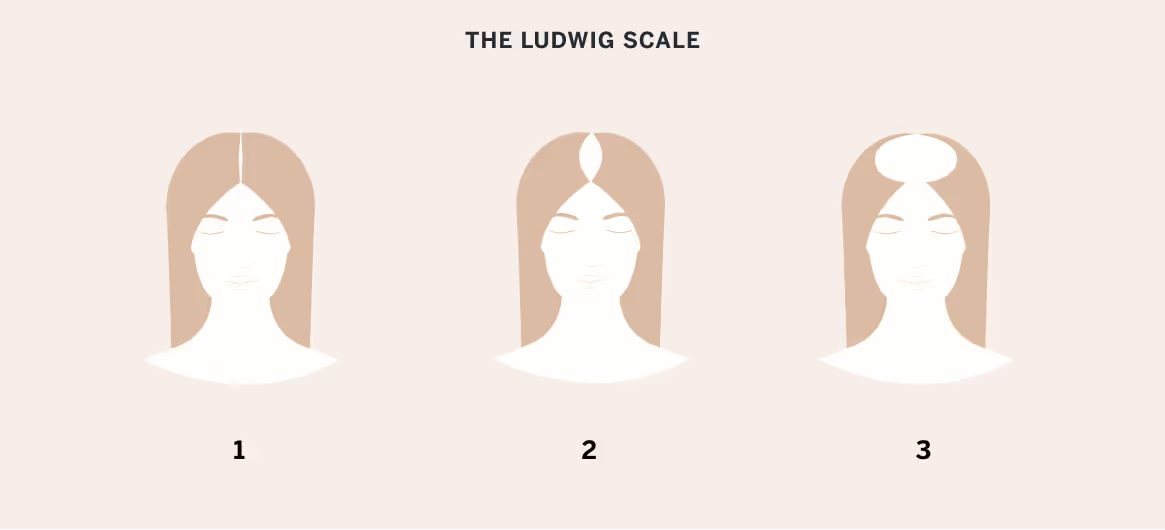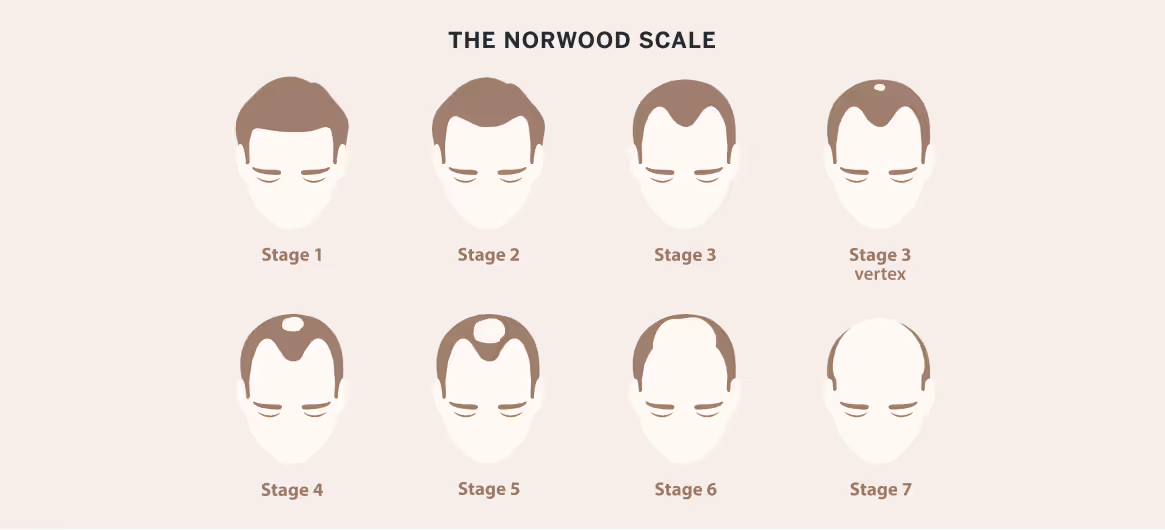Autoimmune hair loss doesn’t just change your appearance—it can challenge your identity, your confidence, and your sense of control, but there’s strength in understanding what’s happening beneath the surface.
When your immune system mistakenly attacks the hair follicles, leading to patchy hair loss or even complete baldness, the result can be alarming—but it’s not the end of your story. Science continues to evolve, and so do the treatments that can help you take back control.
Whether your hair loss is patchy, diffuse, or tied to another autoimmune condition, there are effective ways to manage it and reasons to stay hopeful.
With the right support, a personalized hair growth treatment plan, and a little patience, it’s possible to move forward, not just with hope for regrowth, but with a renewed sense of self-worth.
What Is Autoimmune Hair Loss?
Autoimmune hair loss occurs when the body's immune system mistakenly targets hair follicles, leading to hair loss.
The most common form is alopecia areata, which causes patchy hair loss on the scalp and other parts of the body. Other autoimmune conditions, such as lupus and thyroid disorders, can also contribute to hair loss.
The Role of the Immune System
The immune system normally protects the body from infections and diseases. In autoimmune disorders, it mistakenly attacks healthy cells, including hair follicles. This disrupts the hair growth cycle and causes hair to fall out prematurely.
Types of Autoimmune Hair Loss
Alopecia areata is the most well-known type of autoimmune hair loss. It causes round patches of hair loss on the scalp and can progress to total scalp hair loss (alopecia totalis) or loss of all body hair (alopecia universalis).
Other forms of autoimmune hair loss include central centrifugal cicatricial alopecia, which primarily affects women of African descent and leads to scarring of the hair follicles and permanent loss.
Understanding the specific type of autoimmune hair loss you have is essential for finding the most effective treatment approach. A dermatologist can help diagnose your condition and recommend personalized solutions.
The board-certified dermatologists at Happy Head can review your medical history online and create potent, custom formulations tailored to your needs and delivered to your door.

What Autoimmune Disease Causes Hair Loss?
Several autoimmune diseases can cause hair loss as a symptom. Recognizing these conditions and their impact on hair health is essential for developing a comprehensive treatment plan.
Alopecia Areata and Its Impact
Alopecia areata is an autoimmune disorder that specifically targets hair follicles, causing patchy hair loss. It can affect the scalp, eyebrows, eyelashes, and other body hair.
The condition often starts suddenly and can be emotionally distressing, particularly in children and teens. However, the condition is non-scarring, meaning follicles remain intact and regrowth is possible.
While there is no cure, treatment often involves topical corticosteroids, immunotherapy, or JAK inhibitors to help manage symptoms and promote hair regrowth.
Thyroid Disorders and Hair Loss
Thyroid hormones play a major role in regulating hair growth. When thyroid function is imbalanced, it can disrupt the hair growth cycle, causing hair to thin or fall out.
Both hypothyroidism and hyperthyroidism can lead to diffuse hair thinning due to disrupted hair growth cycles. In hypothyroidism, slowed metabolism impairs follicle function, while hyperthyroidism can accelerate shedding.
Autoimmune thyroid conditions such as Hashimoto’s thyroiditis and Graves’ disease are especially linked to hair loss.
Inflammation caused by these disorders may damage hair follicles, and imbalanced hormone levels can prevent proper hair regeneration, often resulting in overall scalp thinning or brittle hair. Treating the underlying thyroid disorder often helps improve hair health.
Lupus and Hair Loss
Lupus is a chronic autoimmune disease that can affect various parts of the body, including the skin and hair. Lupus-related hair loss can be diffuse, causing overall thinning, or localized, resulting in patches of hair loss.
Lupus, particularly systemic lupus erythematosus (SLE), can cause both scarring and non-scarring types of hair loss. Inflammatory flares can disrupt hair follicles, while discoid lupus can lead to permanent scarring and patchy bald spots.
Hair loss may be worsened by lupus-related stress or medications such as corticosteroids. Early diagnosis and immunosuppressive treatment are necessary for controlling the disease and preventing irreversible follicle damage.
Psoriasis Affecting the Scalp
Scalp psoriasis is an autoimmune condition marked by thick, scaly plaques that can disrupt normal hair follicle function. The inflammation and excessive skin cell turnover can lead to temporary hair loss, especially if lesions are scratched or picked.
Psoriasis-related hair loss isn’t typically permanent, but severe flare-ups or secondary infections may prolong shedding.
Managing the underlying inflammation with topical corticosteroids, medicated shampoos, or systemic treatments often helps reduce symptoms and promote hair regrowth.
Symptoms and Diagnosis of Autoimmune Hair Loss
Recognizing the signs of autoimmune hair loss is the first step in seeking proper treatment. Early intervention can help minimize hair loss and promote regrowth.
Recognizing Early Signs
The most common early sign of autoimmune hair loss is patchy hair loss on the scalp. These patches are usually round or oval and can appear suddenly. Other symptoms may include:
- Itching or burning sensation on the scalp.
- Hair loss on other parts of the body, such as eyebrows or eyelashes.
- Nail changes, such as pitting or ridging.
- Scalp redness or inflammation.
If you notice any of these symptoms, it's important to consult a dermatologist for an accurate diagnosis.
Diagnostic Tests and Procedures
Diagnosing autoimmune hair loss typically involves a combination of physical examination, medical history review, and diagnostic tests designed to rule out other causes of hair loss and confirm an autoimmune disorder. Your dermatologist may perform the following:
- Scalp examination to assess hair loss patterns and scalp health.
- Pull test to evaluate the extent of hair shedding.
- Scalp biopsy to examine hair follicles under a microscope.
- Blood tests to check for autoimmune markers or thyroid dysfunction.
To effectively manage autoimmune hair loss, Happy Head provides a range of dermatologist-created solutions, including prescription topicals and oral medications, designed for effective results.

Treatment Options for Autoimmune Hair Loss
While there is no cure for autoimmune hair loss, various treatment options can help manage symptoms, slow hair loss, and promote regrowth. The best approach depends on the specific type of autoimmune disorder and the severity of hair loss.
Medications for Hair Regrowth
Several medications can help stimulate hair regrowth in people with autoimmune hair loss. These include:
- Topical corticosteroidsare used to reduce inflammation and promote regrowth.
- Minoxidil, a medication available in prescription oral and topical forms, prolongs the hair growth phase.
- Immunosuppressants are used to suppress the immune system's attack on hair follicles.
Lifestyle Changes To Support Hair Health
In addition to medical treatments, certain lifestyle changes can help support hair health and minimize hair loss. These include:
- Eating a balanced diet rich in vitamins and minerals.
- Managing stress through relaxation techniques such as meditation or yoga.
- Being gentle with your hair and avoiding tight hairstyles or harsh treatments.
- Protecting your scalp from sun damage with hats or sunscreen.
Incorporating these habits into your daily routine can help create a foundation for healthier hair growth.
Alternative Therapies for Hair Loss
Some people with autoimmune hair loss find relief with alternative therapies. While more research is needed to confirm their effectiveness, options to consider include:
- Scalp massage to improve blood circulation and reduce stress.
- Peppermint or rosemary essential oils applied topically to stimulate hair growth.
- Acupuncture to balance the immune system and reduce inflammation.
- Nutritional supplements such as biotin or zinc to support hair health.
It's important to discuss any alternative therapies with your dermatologist to ensure they are safe and appropriate for your specific condition.
Managing the Emotional Impact of Hair Loss
Autoimmune hair loss can take a significant toll on emotional well-being. Coping with the physical changes and social stigma associated with hair loss can be challenging. Developing a support system and self-care strategies is essential for maintaining a positive outlook.
Coping Strategies
Some effective coping strategies for managing the emotional impact of hair loss include:
- Connecting with others who have experienced hair loss through support groups or online communities.
- Focusing on self-care activities that boost confidence and reduce stress.
- Experimenting with hair accessories, wigs, or scarves to feel more comfortable and confident.
- Practicing positive self-talk and challenging negative thoughts about appearance.
Remember that hair loss doesn't define your worth or beauty. Embracing self-acceptance and focusing on your overall health and well-being can help you emerge victorious from your battle with hair loss.
Support Resources
There are many support resources available for people with autoimmune hair loss. These include:
- National Alopecia Areata Foundation (NAAF) - provides education, support, and research funding.
- American Hair Loss Association - offers information and resources for various types of hair loss.
- Online support groups and forums - connect with others who understand your experience.
- Happy Head - provides excellent support for autoimmune hair loss, with expert-led treatments and a compassionate team.
Prevention and Long-Term Management
While it may not be possible to completely prevent autoimmune hair loss, certain strategies can help minimize its impact and promote long-term hair health.
Strategies To Minimize Hair Loss
Some strategies to minimize autoimmune hair loss include:
- Managing stress through relaxation techniques and self-care.
- Eating a balanced diet rich in vitamins and minerals that support hair health.
- Avoiding harsh hair treatments and tight hairstyles that can damage hair follicles.
- Protecting your scalp from sun damage with hats or sunscreen.
- Following your dermatologist's recommended treatment plan consistently.
Incorporating these strategies into your daily routine can help create a foundation for healthier hair growth and minimize the impact of autoimmune hair loss.
Maintaining a Healthy Lifestyle
Maintaining a healthy lifestyle is necessary for long-term hair health and overall well-being. This includes:
- Engaging in regular physical activity to reduce stress and improve circulation.
- Getting enough sleep to allow your body to repair and regenerate.
- Staying hydrated to support healthy skin and hair.
- Managing chronic health conditions that can contribute to hair loss.
- Avoiding smoking, which decreases blood flow to hair follicles and causes inflammation.
- Using gentle hair care products, such as Happy Head's Thickening Shampoo and Conditioner, to promote a healthier scalp and hair growth.
By prioritizing a healthy lifestyle, you can support your body's natural hair growth processes and improve your overall resilience in the face of autoimmune hair loss.
Autoimmune Hair Loss: There Is Hope
Autoimmune hair loss can be a challenging and emotional experience, but there are many strategies and resources available to help you manage the condition and maintain healthy hair.
From medical treatments to lifestyle changes and emotional support, a comprehensive approach can help you navigate this journey with confidence and resilience.
Remember that you're not alone in this experience. Seeking support from healthcare professionals, loved ones, and the wider autoimmune hair loss community can provide valuable guidance and encouragement.
With the right tools and mindset, it's possible to find effective solutions to autoimmune hair loss and embrace your unique beauty, with or without hair.
Talk to a board-certified dermatologist to discuss your goals and find the solution that is best for you.
Frequently Asked Questions
Which autoimmune disease causes hair loss?
Several autoimmune diseases can cause hair loss. The most well-known is alopecia areata, where the immune system attacks hair follicles. Others include lupus, Hashimoto’s thyroiditis, Graves’ disease, and psoriasis, especially when they affect the scalp.
How do you treat alopecia areata in children?
Treatment for alopecia areata in children may include topical corticosteroids, minoxidil, or immunotherapy, depending on age, severity, and response to initial treatments. Gentle care of the scalp and emotional support are also key to managing the condition in pediatric patients.
How does Sjögren's affect hair?
Sjögren’s syndrome can contribute to hair thinning due to chronic inflammation, hormonal imbalances, immune system disruption, and dry scalp from reduced oil production. Hair loss may also result from overlapping autoimmune thyroid disease, which is common in Sjögren’s patients.
What is the autoimmune test for hair loss?
There isn’t a single test for autoimmune hair loss, but doctors often order blood tests such as ANA, thyroid panels, and inflammatory markers. In certain cases, a scalp biopsy may also be done to confirm autoimmune activity affecting the hair follicles.












